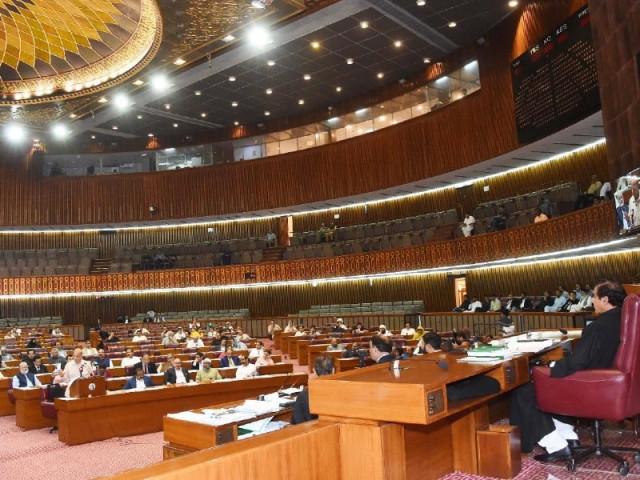Govt plans to 'dodge' president for approval of Elections Amendment Bill
Anticipating resistance from presidency, the govt has found out a way to get the legislation implemented, say sources

The federal government on Thursday managed to get the approval of the National Assembly over the Elections (Amendment) Bill, 2022, which removes the use of electronic voting machines (EVMs) and disallows overseas Pakistanis from voting in the next general election.
However, getting a nod from the presidency, needed for the implementation of the legislation, remained an obstacle for the government.
But, according to insiders, in a stroke of genius, the government has found a way to overcome the hurdle.
Read more: Electoral reforms: NA passes 'Elections Amendment Bill, 2022’
Sources privy to the development told The Express Tribune that President Arif Alvi has already convened parliament's joint session which the government can extend as per its wish so that it can get approval from it if the presidency creates any hurdle for the legislation.
They said that the president had been obstructing the work of the government and not carrying out his constitutional responsibilities, including the change of Punjab governor.
The sources also said that the bills that were approved today (Thursday) in the National Assembly, will be needed to be ratified by the president to become a law. But the president has the constitutional right to take up to 10 days to consider it and can send it back for revision if he deems misfit.
In such a scenario, they added, the bills would be needed to be tabled in a joint session of parliament. The government think tank, during its deliberation, came to the conclusion that if the joint session is asked from the president in such a case, it is likely he would not call it.
Read More: Electoral reforms — by the elites, for the elite
To avoid such a scenario, the insiders revealed, the government had asked the president to call a joint session of parliament, citing discussion on the prevailing economic situation in the country and global security and economic environment.
The president, after mulling over it for eight days, finally convened the session but he cannot adjourn it as it is the domain of the NA speaker who has adjourned the ongoing session till Tuesday and can further extend it if needed.
The government now plans to continue this session as it anticipates resistance from the president to the ratification of the bills but it will have the option of getting them approved by the joint session of parliament.
As per law, the president can only adjourn the session if the government asks. Now, the government will send both the bills to the president for ratification who can either approve them immediately or can continue to create obstacles in the legislation and send it back to the government.
In this case, the government will get approval from parliament's joint session for the bills to become law.



















COMMENTS
Comments are moderated and generally will be posted if they are on-topic and not abusive.
For more information, please see our Comments FAQ